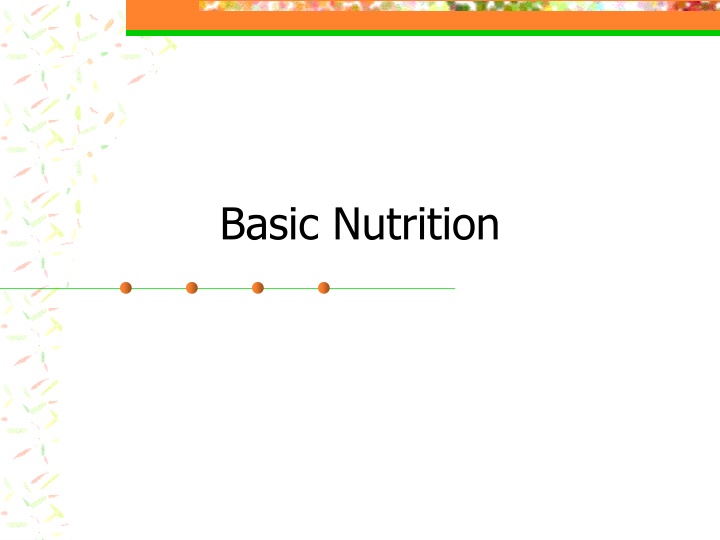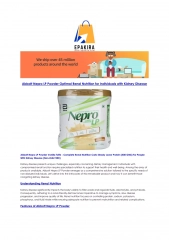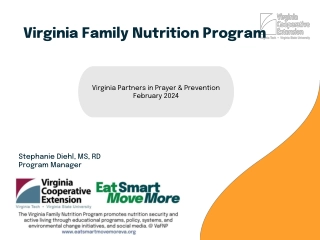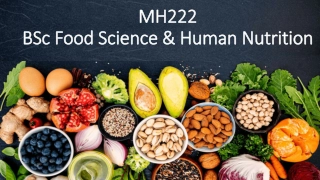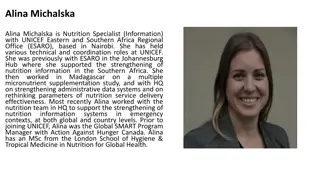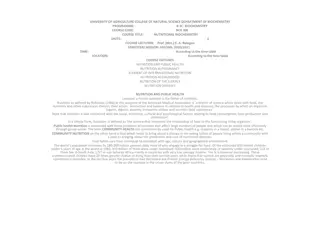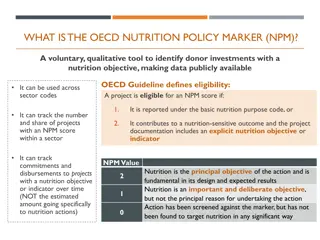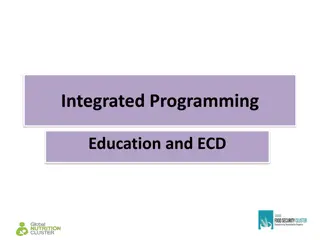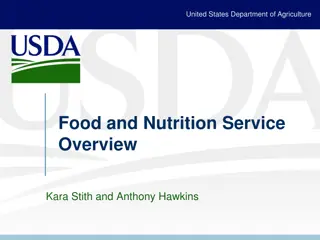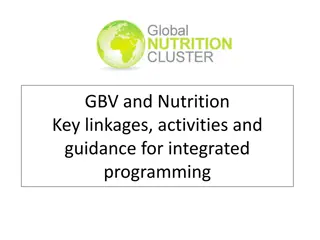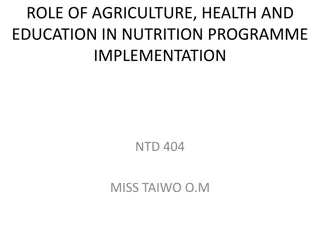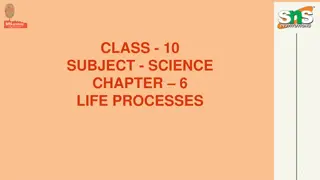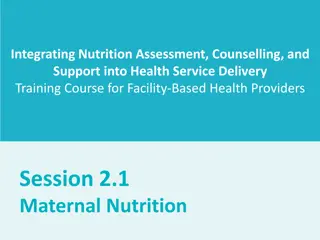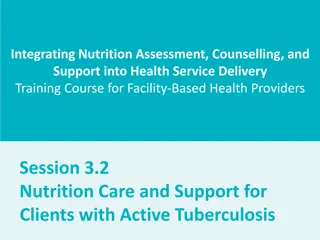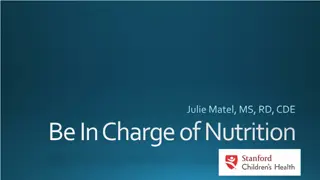Basic Nutrition Science
Nutrition science encompasses the study of essential nutrients, their roles in the body, and how they enhance athletic performance. Learn about nutrients, energy, carbohydrates, fats, proteins, vitamins, minerals, and their importance in maintaining overall health. Discover the different types of sugars and carbohydrates, their digestion process, and the significance of fats in the diet. Gain insights into how nutrients support body functions and the optimal sources of energy for daily activities.
Download Presentation

Please find below an Image/Link to download the presentation.
The content on the website is provided AS IS for your information and personal use only. It may not be sold, licensed, or shared on other websites without obtaining consent from the author.If you encounter any issues during the download, it is possible that the publisher has removed the file from their server.
You are allowed to download the files provided on this website for personal or commercial use, subject to the condition that they are used lawfully. All files are the property of their respective owners.
The content on the website is provided AS IS for your information and personal use only. It may not be sold, licensed, or shared on other websites without obtaining consent from the author.
E N D
Presentation Transcript
Nutrients Everyone must eat to survive Nutrition~ science of certain food substances, nutrients, and what they do in the body Athletic performance can be enhanced by a sound understanding of nutritional principles. Nutrients~ Perform three major roles Grow, repair, and maintain all body cells Regulate body processes Supply energy for cells
Energy The power used to do work or to produce heat or light. Cannot be created or destroyed Plants solar energy chemical energy CHO, fats, and proteins: photosynthesis
Energy Measured in calories: energy needed to raise temperature of one gram of water from 14.5- 15.5 degrees Celsius (C). 1 kilocalorie= 1,000 calories 1 food calorie = one kilocalorie 1 gram of CHO= 4 cal 1 gram of Protein = 4 cal 1 gram of fat = 9 cal 1 gram of alcohol = 7 cal
Nutrients 6 major categories of nutrients Carbohydrates Fats Proteins Water Vitamins Minerals Some made in body Essential Nutrients must be supplied to the body
Carbohydrates (CHO) Sugars, starches, or fibers The body s most efficient source of energy Should account for at least 55% or more of total calories Simple (sugars) or complex (starches) Which is better???
Sugars Monosaccharide Glucose, fructose, and galactose Disaccharides Sucrose, maltose, and lactose Polysaccharides Starch, cellulose, and glycogen
CHO Contd During digestion: Complex CHO are broken down into glucose The human brain is almost totally dependent on glucose for its fuel If not needed, stored as glycogen in the liver and muscle cells Glucose levels are controlled by the hormone insulin and glucagon produced in the pancreas Body has limit to what it can store Any extra glycogen is stored as fat
Fat Essential component of the diet Most concentrated source of energy and helps the body store and use vitamins Minimal amount of fat is essential for normal growth and development Should be limited to less than 25% of total calories with saturated fat less than 10% of total calories
Fats Contd Saturated Fats~ main dietary cause of high blood cholesterol Found mostly in foods from some animals and plants Hydrogenated Fats~ chemical process dealing with carbon chains foods undergo Common in margarine and shortening
Fats Contd Polyunsaturated and Monounsaturated Fats May help lower blood cholesterol when used in place of saturated fats Poly: oils from plants; liquid or soft seafood Safflower, sesame, and sunflower seeds, corn and soybeans, many nuts and seeds Mono: liquid at room temp canola, olive, peanuts oils, and avocados
Fats Contd Trans-fatty Acids~ the new evil? Refers to the physical positioning of hydrogen atoms around carbon chain Found in various animal products Formed in hydrogenation process Raise total blood cholesterols more than saturated fats
Proteins Make up the major structural components of the body Needed for growth, maintenance, and repair of all body tissues Body tends not to use much protein for energy Intake Should be 12-15% of total calories Approximately 0.8g PRO/kg body wt
Proteins Contd Made up of amino acids Body s proteins are made up of about 20 different amino acids Essential amino acids are needed by the body 9 must be provided Other amino acids are produced in the body Complete Incomplete Diet large in protein needs to contain the essential amino acids Meat, fish, poultry, eggs, milk, and dairy
Vitamins Nutrient that helps the body use CHO, proteins, and fats Body cannot break them down to release energy Classified into two groups: Fat-soluble and water soluble
Fat-Soluble Vitamins Dissolved in fats and stored in the body Taking large doses can be toxic! Extra amounts are not easy to eliminate from the body in urine Instead stored in liver or body fat until needed, therefore potentially toxic Vitamins A, D, E, K
Fat Soluble Vitamins Contd Vitamin A~ Helps in manufacturing of protein and DNA Milk, egg yolk, green & yellow fruits/veggies Deficiency: Night blindness, dry skin, growth failure Excess: Headaches, nausea, loss of hair Vitamin D~ Normal bone growth and development Exposure to sunlight, fortified dairy products Deficiency: Rickets in children leading to bone deformity Excess: Appetite loss, failure to grow
Fat Soluble Vitamins Contd Vitamin E~ Protects cell membranes from destruction Vegetable oils, some fruits/veggies, whole grains Deficiency: Breakage of red blood cells anemia Excess: Nausea and diarrhea; interferes with vitamin K if vitamin D is deficient Vitamin K~ Production of blood-clotting substances Green leafy veggies; normal bacteria that live in intestines produce K that is absorbed Deficiency: Increased bleeding time Excess: No toxicity level known
Water Soluble Vitamins Dissolved in watery solution and are not stored Therefore should be supplied in the diet each day Thiamin (B1), Riboflavin (B2), Niacin (B3), Pyridoxine (B6), B12, C, Folic acid, Pantothenic acid
Water Soluble Vitamins Contd Riboflavin (B2)~ Helps maintain the nerve s myelin, assists making energy available to the brain Milk, liver, fruits, and veggies Deficiency: Dry skin, cracked lips, behavior problems in children Excess: No known toxicity levels Thiamin (B1)~ Helps the brain process energy from glucose and proteins Cereals, pork, peas Deficiency: Lack of energy, nerve problems, poor sleep Excess: No known toxicity levels
Water Soluble Vitamins Contd Niacin (B3)~ Helps the brain produce essential chemicals: aids in protein manufacturing Liver, meat, poultry, peanut butter, enriched breads and cereals Deficiency: Skin problems, diarrhea, mental depression Excess: Skin flushing, intestinal upset/ulcers Pyridoxine (B6)~ Helps the brain produce essential chemicals: aids in protein manufacturing White meats, whole grains, liver, egg yolk Deficiency: Poor growth, anemia, mood swings, poor sleep Excess: Severe loss of coordination from nerve damage
Water Soluble Vitamins Contd Vitamin B12~ Production of genetic material; maintains central nervous system Foods of animal origin Deficiency: Neurological problems Excess: No known toxicity Folic Acid~ Helps produce RNA/DNA- both important in the formation of nucleic acids and storage of recent memories Wheat germ, liver, yeast, mushrooms, green leafy veggies, fruits Deficiency: Anemia, apathy, irritability, impaired memory Excess: No known toxicity
Water Soluble Vitamins Contd Pantothenic Acid~ energy from CHO, fats, and Proteins Widely found in foods Deficiency: Not observed in humans under normal conditions Excess: No known toxicity Vitamin C~ Helps in the utilization of protein: improves absorption of certain forms of iron needed by the brain Fruits and veggies Deficiency: Scurvy, fatigue, swollen joints, depression Excess: Kidney stones, diarrhea
Minerals More than 20 mineral elements need to be supplied by the diet 6 very common: iron, magnesium, potassium, zinc, chromium, and water Role is unclear Needed for a variety of jobs such as forming strong bones and teeth, generating energy, activating enzymes, and maintaining water balance Most stored in the body: bones and liver
Iron Assists in the processing of nutrients required in brain activity Helps process neurotransmitters and DNA Found in red meats and beans Deficiency: conduct disorder, inattentiveness, hyperactivity, poor concentration, anemia
Magnesium Helps get energy from nutrients for the brain Found in most foods Deficiency: Irritability, nervousness, lethargy, depression, and confusion
Potassium Required for normal levels of brain neurotransmitters Helpful for preventing cramps Found in fruits (bananas) Deficiency: Feelings of weakness, loss of appetite, nausea, irrational thinking, confusion
Zinc Required in virtually every enzyme reaction in the brain Helps manufacture RNA, DNA, and protein Helps provide energy from glucose and protein Found in most foods (fortified) Deficiency: Lethargy, irritability, poor eating habits, poor appetite, fatigue, and confusion
Chromium Essential for glucose metabolism Brain in almost totally dependent on glucose for its fuel Found: Fortified in most foods Deficiency: poor concentration, impaired short-term memory, mood fluctuations, general feelings of tiredness
Water Most essential nutrient Live for weeks/months without the other nutrients Perish after a few days without water 2%-3%: impair performance 7%-10%: fatal 60% adults body weight = water Takes part in the digestion process and maintaining homeostasis Adult requirement is 2.5 liters of water a day Deficiency: Dehydration symptoms = death
Hydration 6-8 glasses for average Prehydrate two of fluids within an hour of exercise During and after exercise drink as much as possible
Sports Drinks Sugar Minerals Sodium Potassium Water Vitamins Ephedra (ma huang) Advantages: Sugar content: allowing muscles to gain energy and delay fatigue
Dietary Fiber Indigestible component of plants Soluble Helps lower cholesterol levels Insoluble Adds bulk to intestinal contents 25 grams a day
Daily Values 2000 calories per day (DRV) 30% fat 65 grams 10% saturated fat Less than 20 grams 60% CHO 10% protein Cholesterol less than 300 milligrams Sodium less than 2,400 milligrams
Nutritional Quackery Without scientific research Not treated by the FDA Prey on innocent Be an informed consumer
Making Weight Gaining weight Weight training Losing weight Females: 1,000-1,200 Males: 1,200-1,400 Combination of diet and exercise
Ideal Weight Calculations BMI =Weight (lb.) / height (in.)/height (in.) x 703 Normal weight: 18.5 to 24.9 Overweight 25 to 29.9 Obesity 30 or greater
